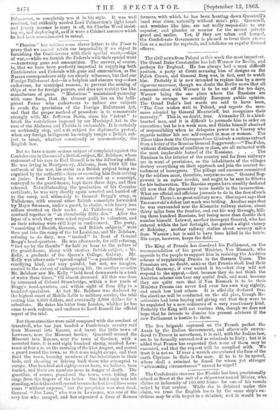But we have a more serious subject of complaint against
the Confederates in the case of a British subject, Mr. Belshaw, whose statement of his case to Earl Russell is to the following effect. He was living in Montgomery, Alabama, from 1859 till the outbreak of the war, his status as a British subject being re- cognized by the authorities there as excusing him from serving on Juries. Last February he was arrested as a conscript, conveyed to the guard-house, kept there three days, and then released. Notwithstanding the 'production of his Consular certificate, he was very shortly again arrested and hurried off to the camp, and ultimately to General Bragg's army, in Tullahoma, with several other British conscripts forwarded by Major Swanson, under a guard, in chains, with heavy iron collars rivetted on their necks. At Tullahoma they were confined together in "an abominably filthy den." After the lapse of a week they were asked repeatedly to volunteer, and on their refusing were still kept in confinement. The party, "consisting of Danish, German, and British subjects,' were then put into the camp of the 1st Louisiana, and Mr. Belshaw, refusing to do duty, was " bucked " in front of General Bragg's head-quarters. He was afterwards, for still refusing, tied up by the thumbs" for half an hour to the rafters of the guard-house along with another British subject, a Mr. Kelly, a graduate of the Queen's College, Galway. Mr. Kelly was afterwards "spread-eagled "—a punishment of the crucifying kind, and very painful, but nut, we imagine, carried to the extent of endangering life. On another occasion Mr. Belshaw saw Mr. Kelly "held head downwards in a tank of water three times," till almost drowned. All this was done by command of Colonel Strawbridge, within a few yards of Bragg's head-quarters, and within sight of from fifty to a hundred spectators. At last Mr. Belshaw was declared by the highest court of Mobile liable to military service the trial costing him 4,000 dollars, and eventually 3,000 dollars for a substitute. He dates his letter from London, whither he has come to seek redress, and encloses to Lord Russell the official report of the trial.


































 Previous page
Previous page